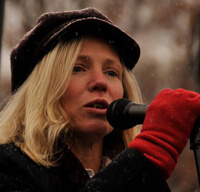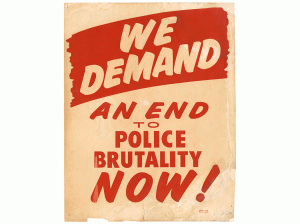Reprinted from popularresistance.org
By Kevin Zeese and Margaret Flowers,
The entire system of policing in the United States is in crisis. Police murdering civilians has become a too common nightmare across the United States. The police murders of Michael Brown in Ferguson, MO, Eric Garner in New York City, Walter Scott in Charleston, SC, Tamar Rice in Cleveland OH, Freddie Gray in Baltimore, MD, Laquan McDonald in Chicago, IL and so many more have spurred a movement to transform policing.
The power relationship between police and the community is out of balance. Militarized policing of black and brown communities resembles an occupying force. While many police departments use the slogan "protect and serve," in too many communities, people do not feel protected or served. They feel threatened, harassed and abused by police.
The relationship between police and the people needs to change. While there have been some positive reforms like police body cameras, special units to investigate police and increased prosecutions of police, these are insufficient. The most promising transformational change is to put in place community control of police through a democratically-elected police accountability board.
The Crisis
The constant police killings and shootings often caught on video and shared on social media have created a movement to transform policing. Associated Press described it, writing: "The videos - and the outrage that followed - helped ignite the most powerful civil rights movement since the 1960s." The widespread police violence has become a national racial justice issue.
Police violence has been a reality in the United States from the start. The poster to the right could be carried today, but it is more than 50 years old. Dr. Martin Luther King, Jr., said in the I Have A Dream Speech, "We can never be satisfied as long as the Negro is the victim of the unspeakable horrors of police brutality." Police violence has been part of centuries of oppression of Black people in the United States since they were first brought to the continent as slaves.
Slavery and racism are intertwined with policing, as Gary Potter Ph.D. wrote in The History of Policing in the United States:
"The genesis of the modern police organization in the South is the "Slave Patrol" (Platt 1982). The first formal slave patrol was created in the Carolina colonies in 1704 (Reichel 1992). Slave patrols had three primary functions: (1) to chase down, apprehend, and return to their owners, runaway slaves; (2) to provide a form of organized terror to deter slave revolts; and, (3) to maintain a form of discipline for slave-workers who were subject to summary justice, outside of the law, if they violated any plantation rules. Following the Civil War, these vigilante-style organizations evolved in modern Southern police departments primarily as a means of controlling freed slaves who were now laborers working in an agricultural caste system, and enforcing "Jim Crow" segregation laws, designed to deny freed slaves equal rights and access to the political system."
The 1929 Illinois Crime Survey found that although blacks made up just five percent of the population, they constituted 30 percent of the victims of police killings. Police violence has been the spark for uprisings in black communities. Newark had one of the deadliest riots when in 1967 police officers beat a black cab driver leading to an insurrection where 26 people died over four days of unrest. The National Advisory Commission on Civil Disorders investigated the causes of major uprisings concluding: "police actions were 'final' incidents before the outbreak of violence in 12 of the 24 surveyed disorders."
The 1991 video of the bloody beating of cab driver Rodney King showed police brutality on television. Police hit King more than 50 times with their batons. When they were acquitted, the verdict led to an uprising that lasted six days, killing 63 people and injuring 2,373. The National Guard, US Army, and Marines were deployed in the community.
Today, the widespread acts of violence cannot be claimed to be isolated incidents of one bad apple. This violence is documented by the media like The Guardian and non-profit organizations like The Marshall Project. More than 1,100 people per year are killed by the police - more than four times the number of people lynched or executed by capital punishment in the worst of years - about one person every eight hours.
(Note: You can view every article as one long page if you sign up as an Advocate Member, or higher).






